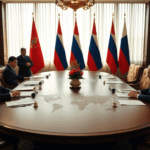Table of Contents
In today’s world, where societal narratives significantly influence personal identity, discussions around gender identity have gained prominence. Recent remarks by prominent figures, particularly regarding societal pressures, have ignited conversations about how external perceptions affect individual choices. This article explores the complexities of these narratives and their implications for gender identity.
Societal Pressures and Gender Identity
Societal pressure plays a critical role in shaping personal identities. As social movements gain traction, they often provide a backdrop for individual identity formation. This is especially evident during adolescence, a period when individuals are particularly vulnerable to external influences.
Negative portrayals of certain groups, such as white males, can lead to significant internal conflicts.
For instance, a comment from a well-known business magnate suggested that the negative representation of white males might lead some to adopt transgender identities.
This raises important questions about the relationship between societal narratives and personal choices. It emphasizes how entrenched societal perceptions can shape individual identity formation. The notion that some may choose a celebrated identity in response to societal rejection is both thought-provoking and complex.
Furthermore, the concept of ‘deadnaming,’ highlighted by various public figures, underscores the sensitivity surrounding identity labels and their impact on individuals. This reflects the challenges many face while navigating their identities amid conflicting narratives.
The Role of Media and Public Figures
Media representation and public discourse are instrumental in shaping societal beliefs about gender identity. The narratives constructed within media often promote specific ideologies that can either empower or marginalize individuals. When influential figures speak out on gender identity issues, their opinions can resonate widely, potentially reinforcing or challenging existing beliefs.
A recent discussion highlighted the pressures faced by transgender individuals, particularly in relation to societal expectations. This underscores the importance of comprehending these narratives. The dialogue surrounding the acceptance of diverse gender identities is intricate, influenced by cultural, social, and political factors.
Moreover, public responses to these discussions reflect broader societal trends. Engaging critically with these narratives allows for a deeper understanding of how individuals navigate their identities amid an array of societal messages.
Looking Ahead: The Future of Gender Identity Narratives
The future of gender identity narratives is likely to evolve as societal beliefs continue to change. With increasing visibility and representation of various identities, the challenge lies in fostering an inclusive dialogue that respects individual choices while acknowledging societal influences. The conversations initiated by influential figures highlight the power of narratives in shaping perceptions and identities.
As we advance, it is crucial for society to engage in constructive discussions that honor the complexities of individual identities without resorting to simplistic portrayals. The interplay between societal narratives and personal identity will remain a significant area for exploration in understanding the human experience.





